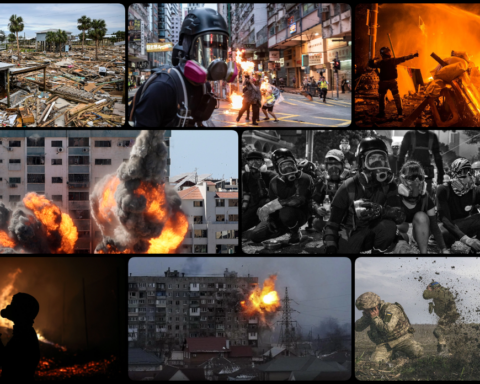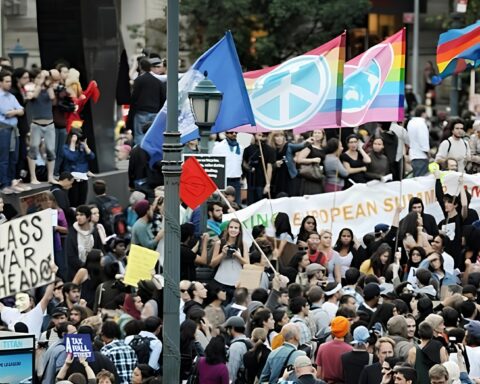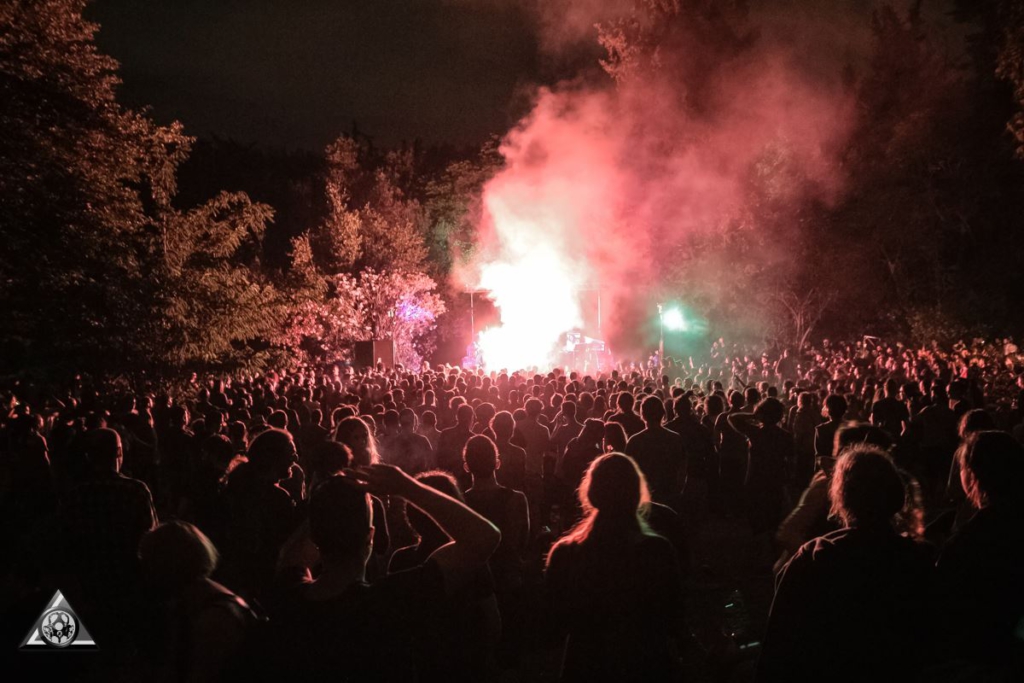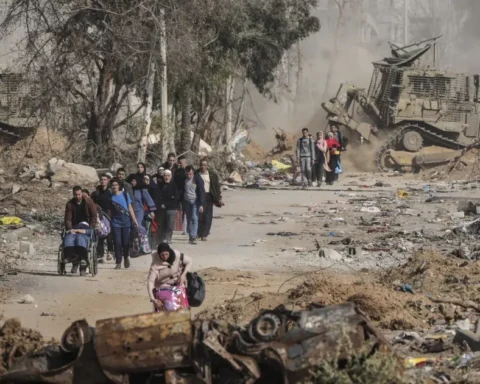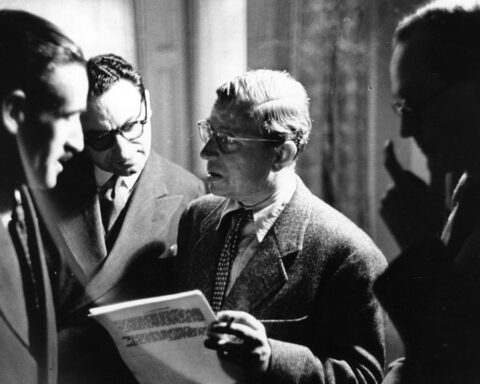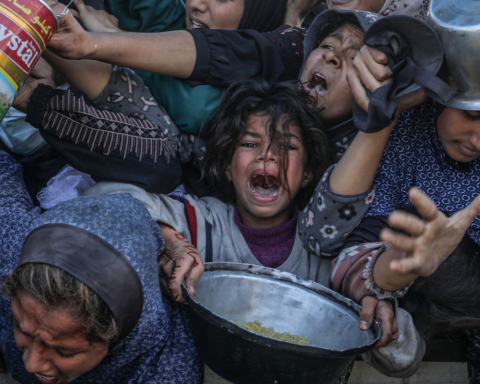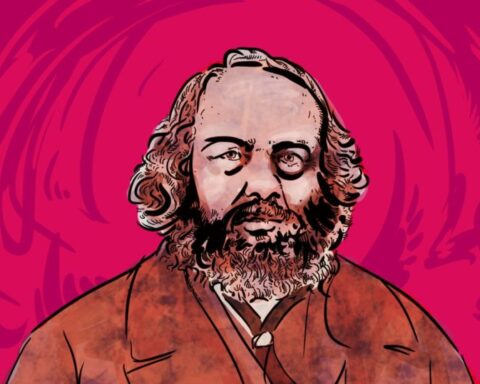Anarchists are against nationalism; everyone knows that. Instead of solidarity across borders and anti-hierarchical antagonism within them, nationalism engenders loyalty to the state with its armed forces and public symbols, encourages the oppressed to identify with their compatriot oppressors, scapegoats minorities, and pits workers of different countries against one another in economic competition or open warfare. Opposition to nationalism is an almost trivial starting point for anarchist politics, reflected in antimilitarist actions, antifascism, and migrant solidarity to name a few. Besides, if anarchism “stands for a social order based on the free grouping of individuals” (Goldman 1911a/2014: 41), then anarchists can only reject the proposition that individuals owe their loyalty to a pre-existing collective of millions of strangers into which they never chose to be born. Anarchists work towards a society that would see the end of nations and nationalism, along with social classes and all forms of domination.
So much for the propaganda line. This chapter, however, seeks to elaborate some philosophical questions that arise, not from the anarchist opposition to national chauvinism as such, but from the engagement with race and ethnocultural identity more broadly.[1] Unlike the anarchist concept of the nation as a state construct, the idea of a group identity extending from immediate kinship through common ancestry and mediated through language and culture survives the critique of nationalism. Yet this idea brings out very sharply the tension between the deconstructive impulse of anarchist thought and the demands of decolonial solidarity in the anarchist movement. On the one hand, while some anarchists have adopted a naturalist understanding of “peoples” as constituents of the human race, others have explicitly sought to problematise ethnocultural identity – either dismissing it in favour of class or, more interestingly, through the deconstruction of claims to ethnic and linguistic continuity and affinity. The move to deconstruct ethnocultural peoplehood, apart from its poststructuralist attractions, remains appealing in the critique of ethno-nationalist state ideologies and in the confrontation with the far right.
On the other hand, ethnocultural identity is central to movements in which anarchists are participants or accomplices, from indigenous and black liberation in North America to national liberation movements in Chiapas, Palestine and Rojava. In this context, does the deconstructive impulse not risk attacking the very particularisms that make claims on anarchists’ solidarities? Are appeals to ethnocultural identity subject to deconstructive critique selectively, on a friend-or-foe basis? Or is this an inevitable disjuncture of theory and practice which can only be approached as a record of the social antinomies that underlie it, and resolved through their eventual transformation? My central argument here is that the deconstructive impulse towards ethnocultural (and gender, and other) identity is valuable and should be sustained; nevertheless, a principle of subsidiarity should be applied to its deployment. This creates an ethical filter which takes personal stakes and asymmetries of power into account in the practice of anarchist philosophy. By setting up the discussion in these terms, I am using the lens of nationalism to read between theoretical and political commitments and to suggest a new starting point for discussions of decolonial solidarity.
I begin by briefly highlighting the anarchist movement’s transnational composition, and its differing responses to national liberation movements, as contexts for the debate. Then, starting with the traditional anarchist critique of the nation as a state construct (as opposed to the idea of peoples), I identify three different approaches to the role of ethnicity in collective identity. These are the naturalist approach (which sees specific peoples as part of a human family); a class-centric approach (which dismisses ethnocultural identity) and the culturalist approach. The latter, expressed most fully by Rudolf Rocker, deepens the attack on nationalism by systematically undermining the stability and significance of kinship and language, as foundations for the peoplehood that nationalism claims to own. Reviewing the decolonial critique of universalism as applied to the former two approaches, I argue that the latter’s anti-foundationalist impulse may also fall afoul of the particularisms that ally with anarchism in decolonial struggles. If the anarchist ethic of recognition entails prima facie acceptance of oppressed people’s – and peoples’ – own articulation of their identities and goals, then deconstruction may disrupt the balance between conceptual coherence and political solidarities. As a proposed resolution, I suggest an ethics of deconstruction informed by the principle of subsidiarity and by attention to positionality. I close with a comment on decolonising bioregionalism.
Nation, People, Class and Culture
Anarchist engagements with nationalism were influenced by the movement’s own transnational composition and cosmopolitan ethos (Levy 2011, Bantman 2013). Anarchism developed from the start across borders, marked by “supranational connections and multidirectional flows of…ideas, people, finances and organisational structures…often built upon migratory diasporas and…reinforced by the movement’s press and the travels of major activists” (van der Walt and Hirsch 2010: xxxii). The commonplace Eurocentric view notwithstanding, anarchists were active in Argentina, Cuba and Egypt as early as the 1870s, whereas the first two decades of the 20th century saw sophisticated anarchist movements emerge from the Philippines, Peru and Japan to South Africa, Chile and Turkey (Anderson 2005, Turcato 2007, Shaffer 2009, Khuri-Makdisi 2010, Ramnath 2011). In Britain and in North and South America, the influx of Jewish, Italian and Irish immigrants created multicultural working class communities in which a radical cosmopolitan outlook took hold, embracing diversity and solidarity across ethnic and cultural lines (Fishman 1975,Moya 2004, Katz 2011, Zimmer 2015). These transnational encounters continue to animate the anarchist movement today (Cuevas Hewitt 2007, Kalicha and Kuhn 2010).
Anarchists were also early and consistent opponents of racism and slavery. Joseph Déjacque, an early French anarchist active in New Orleans in the 1850s, looked forward to a revolutionary alliance between black slaves and white proletarians, and favourably compared John Brown to Spartacus. He expected that the “monstrous American Union, the fossil Republic, will disappear” in the cataclysm of revolution, creating a “Social Republic” wherein “Blacks and whites, creoles and redskins will fraternize…and will found one single race. The killers of Negros and proletarians, the amphibians of liberalism and the carnivores of privilege will withdraw like the caymans…to the most remote parts of the bayous” (Déjacque 1858/2013). Later, at the height of lynching murders in the American South, the anarchist James F. Morton wrote an extensive pamphlet against racism and its use to dehumanise and justify atrocities. “The blind stupidity of racial prejudice is simply unfathomable”, he wrote, “it acts in mad disregard of all logical considerations, and when challenged can give no coherent account of itself…it stops its ears in blind rage” (Morton 1906: 31. Cf. Damiani 1939).
Jean Grave, as part of his critique of nationalism and militarism, disparaged both the irrationality of notions of racial and cultural superiority, and their insidious role in causing workers to legitimate their own exploitation. In Moribund Society and Anarchy (1899) he strongly condemned colonisation as robbery and murder writ large, poured derision on its claims to be a “civilising” force, and supported the revolts of colonised peoples. In a chapter titled “There are no inferior races”, he repudiates a series of then-common arguments about the inferiority of non-Europeans and draws a parallel between racism and the self-serving bourgeois designation of the poor as inherently inferior.
Another important context for anarchist responses to nationalism has been the engagement with national liberation movements. On the one hand, Proudhon and Bakunin both opposed the Polish insurrection, which despite significant differences of approach they both saw as an elite-led effort that sidestepped the social question and threatened to embolden either French or Prussian expansionism (Kofman 1968). Others, however, offered support to the liberation struggles of peoples under foreign rule, within the context of a revolutionary project to abolish domination and the institutions that maintain it. Landauer (1912/2010: 232) supported the wars of “revolutionary peoples” against foreign oppression, while building “solidarity among all peoples in struggle against war and the state. Earlier, Kropotkin argued that the removal of foreign domination was a precondition to social revolution, and supported the national liberation of “the Armenians in Turkey, the Finns and Poles in Russia” as well as “the blacks in America“, whose situation he considered equivalent to foreign occupation (Kropotkin 1897/2014: 140). For Kropotkin, genuine internationalism had to oppose imperialism and to “proclaim the complete liberty of each nation, however small it might be, and its absolute right to develop along the lines it wished”, while anarchists supporting national liberation struggles should aim to “enlarge the meaning of their revolt, raise up among them a flag which represents a superior ideal” (qtd. in Cahm 1978b: 56).
In the later 20th century, anarchists distanced themselves from Marxists’ often uncritical championing of centralising states in the former colonies of Africa and south Asia. In the Algerian context, “French anarchists like Camus, Joyeux, Guerin, and those in Noir et Rouge, openly criticized actions and orientations of the FLN while also supporting the principle of ending colonial rule [and] Algerian autogestion“ (Porter 2011: 487). More recently, Hakim Bey has drawn attention to new national liberation movements which are “both non-hegemonic & anti-Capitalist” including Kurdish, Sahrawi, Hawaiian and Puerto Rican movements, those seeking “maximum autonomy for Nativ eamerican ‘nations’”, the Mexican Zapatistas, and “at least in theory the bioregionalist movement in the US” (Hakim Bey 1996: 49).
In all of these responses to nationalism, a distinction has prevailed between “the nation” understood as an artificial entity constructed by the state, and terms like “nationalities”, “peoples”, “folks” and “races”, which were either construed as factual entities or themselves subject to destabilising critique. Nationalism, in this context, is defined and rejected as an ideology of loyalty to an existing nation state (cf. Goldman 1911b, Tolstoy 1990). Rudolf Rocker’s central argument in Nationalism and Culture was that nationalism had replaced religion in the modern era as the chief ideological tool of legitimation for the ruling classes. The nation “is not the cause, but the result of the state. It is the state that creates the nation” which is “the artificial result of the struggle for political power, just as nationalism has never been anything but the political religion of the modern state” (Rocker 1937:200-1). As for ethnocultural identity and peoplehood, we can distinguish between three approaches. I will call these the naturalist, classist and culturalist approaches.
A naturalist approach sees peoples as factual entities rooted in common geographical, cultural, linguistic and/or ancestral features. For Bakunin, the homeland (patria) represented a “manner of living and feeling” which is “always an incontestable result of a long historic development”. Love of homeland among the “common people…is a natural, real love” while “political patriotism, or love of the State, is not [its] faithful expression” but one “distorted by means of false abstraction, always for the benefit of an exploiting minority” (Bakunin 1953/1871: 324; cf. Cahm 1978a). In his article on the rising Finnish nationalism, Kropotkin emphasised alongside heritage and language the role of “union between the people and the territory it occupies, from which territory it receives its national character and on which it impresses its own stamp, so as to make an indivisible whole both men and territory” (Kropotkin 1885). While opposed to the nationalism promoted by existing states, Kropotkin continued to regard the human race as composed of more or less territorially-defined ethnocultural groups, while celebrating diversity in the “international family” and seeking “to develop local, individual characteristics.” (qtd. in Cahm 1978: 53. Cf. Kropotkin 1897/2014). Such an approach, while positively encouraging cultural diversity, sets up a continuum leading from the individual through the ethno-cultural group and on to the human species. Similarly for Jean Grave (1899: 105-110),
Certainly we do not want to assert that all races are absolutely identical; but we are persuaded that all have certain aptitudes, certain moral, intellectual, and physical qualities, which, had they been allowed to evolve freely, would have enabled them to take their part in the labor of human civilization.
The naturalist approach is thus often grounded in a universalist, humanist ethics – the “belief in the shared humanity of people regardless of their membership in different cultural, ethnic and gender groups, and their complementary affinities in a free society as rational human beings” (Bookchin 1995).
A second approach denies ethnocultural identity any validity as a political point of reference, supplanting it with class. Though not very prevalent in the anarchist tradition, it has more recently been heard from self-identified “class struggle anarchists”. Schmidt and van derWalt, who see ethnicity (as well as gender) as theoretically subsidiary to class, place nationalism and ethnocultural identity on par with “identity politics”, the latter construed as necessarily essentialist and fragmentary. Instead, they promote the unifying potential of “class politics” which can mobilise “ordinary people…across racial lines” (2009: 305). Here, race or ethnicity are accorded an entirely negative function, rejecting the loyalties they imply as false consciousness and refusing to see the power relations they encode as constitutive. In the context of Palestine, this approach often leads to statements about the “real interests” of “the proletariat of Gaza and the West Bank”, which lie not in self-determination within the existing system but “in combining with workers everywhere to end all exploitation” (The Free Communist 2014; cf. SolFed 2002, McCarthy 2002, Anarchist Communist Initiative 2004). A more rarefied variation of classism appears in Alfredo Bonanno’s essay on national liberation. Bonanno argues that “anarchists refuse to participate in national liberation fronts; they participate in class fronts which may or may not be involved in national liberation struggles” (1976: 16). In doing so, he adopts the premise of the Fronte Libertaire that “ethnic culture is class culture, and for this reason is revolutionary culture” (15). Therefore,
The ethnic base of today consists of the whole of the exploited people who live in a given territory of a given nation, there being no common ethnic base between exploiter and exploited. It is logical that this class basis will be destroyed along with the destruction of the political state, where the ethnic limit will no longer coincide with the exploited…but with the whole of the men and women living in that territory who have chosen to live their lives freely (ibid.).
Bonanno goes beyond a rejection of ethnicity as identity – the concept is instead ontologically absorbed into class. The logic proceeds through the recursive application of a specific account of revolutionary accomplishment to pre-revolutionary conditions. Since it is only class consciousness that can define a post-capitalist reconstruction of territorially-bound populations, the “ethnic limit of the revolutionary process of free federations” corresponds to that of a proletariat in the process of self-abolition. Aside from the blatant mystification of identifying class with ethnicity, this formulation cannot account for realities such as ethnic divisions within exploited populations, as seen both in colonial circumstances and in the multiethnic global north.
The third, culturalist approach is also critical, but instead of supplanting ethnic identity with class, it destabilises appeals to common kinship, language and heritage as constitutive of human groups. What remains is an effectively anti-foundationalist concept of folk culture, identified with localised patterns of human interaction which remain in flux as they relay populations, practices and ideas. This approach is present already in Gustav Landauer’s account of the folk, which is in fact constructed in complete detachment from ethnocultural signifiers. As Grauer points out, Landauer perceived the folk “not as a political or economic structure, and definitely not as a biological entity determined by fixed and unalterable blood ties…[N]either a common language nor a measure of geographical unity” were necessary features of folk spirit (1994: 8-9). Landauer’s mythical folk is a spiritual entity, “an equality of individuals – a feeling and reality – which is brought about in free spirit to unity and to union” (qtd. in Grauer 1994: 6). Anarchic a priori, this subaltern free culture exists underneath and as-against hierarachical social relations. The organic and free unfolding of spirit among the people is contrasted to the mechanistic and compulsive state, and poised to replace it with voluntarism and mutual aid. The absence of ethnocultural references in Landauer’s account of the folk is important in allowing his organicism to resist identification with the Volkisch right. But the result is a concept of the folk clearly removed from any naturalist presumption of an ethnocultural basis for peoplehood.
Rudolf Rocker, in Nationalism and Culture (1937), is more explicit. In the first part of the book he is concerned with a historical and ideological critique of the modern nation state, and in this context sets up the distinction between the nation and the people in familiar naturalist terms:
A people is the natural result of social union, a mutual association of men [sic] brought about by a certain similarity of external conditions of living, a common language, and special characteristics due to climate and geographic environment. In this manner arise common traits, alive in every member of the union, and forming a most important part of its social existence (200-1).
Yet this formulation is misleading, since in the second part of the book Rocker reboots the critique of nationalism, extending it to an attack on the stability and significance of language and ethnic ties. While the primary aim is to attack nationalism at its base assumptions, Rocker’s critique ends up destabilising the naturalist account of peoplehood as well. After demonstrating that there is no “community of material interest and identity of morals, customs and traditions” (275) within existing nations, Rocker turns to language. Describing many borrowings and loan-translations among European and middle-eastern languages, and cases of populations changing their language, he concludes that “language is not the result of a special folk-unity. It is a structure in constant change…always in flux, protean in its inexhaustible power to assume new forms” (288). It is thus “no characteristic of a nation: it is even not always decisive of membership in a particular nation. Every language is permeated with a mass of foreign speech elements in which the mode of thought and the intellectual culture of other peoples lives” (297).
Rocker’s next chapter on race, written in the shadow of Nazism, is largely concerned with the baselessness of “scientific” racism. Yet in introducing this critique he points beyond the mere rejection of racial supremacism to a questioning of ethnocultural distinctiveness in itself. Not only is there no connection between “mental, moral and cultural qualities” and the “real or imaginary physical characteristics of a race” (298), but these characteristics – like language – are themselves the result of populations mixing and migrating. As a result there are no “pure races”, not even “among the so-called savage peoples” such as “the Eskimos or the inhabitants of Tierra del Fuego…race does not describe something fixed and unchangeable, but something in a perpetual state of flux, something continually being made over” (301).
We will return to the comment on indigenous people later on. For the moment, it should be noted that with his emphasis on flux and change, Rocker is seeking to excise any stable ethnic characteristics from his cultural account of peoplehood. Peoples are, in this sense, local snapshots of a worldwide process of cultural unfolding, which at once displays “endless diversity” and is everywhere driven by “the aspiration for worthier organization and loftier spirit in social and individual life that is deeply rooted in the social sentiment of man” (345). Rocker’s concept of culture thus relies on the opposite of isolation and self-containment:
cultural reconstructions and social stimulation always occur when different peoples and races come into closer union. Every new culture is begun by such a fusion of different folk elements and takes its special shape from this…a culture is born or fertilised only by the circulation of new blood in the veins of its representatives…In all the great epochs, culture has marched hand in hand with the voluntary union and fusion of different human groups (347-350)
I would like to argue that Rocker approaches an anti-foundationalist position in his deconstruction of language and race as anchors for nationalism, and in his preference for flux and mutability in the cultural conception of peoplehood. In opting for an ontological rather than normative critique of nationalism, his approach bears the mark of the negating, conceptually nihilistic impulse which runs through the anarchist tradition, from Stirner’s iconoclasm and Bakunin’s “destructive urge” to Goldman’s calls for a transvaluation of social mores. This impulse has sustained anarchism’s critical edge and experimental approach to social reconstruction, and marks it as a forerunner of poststructuralist thought (Jun 2012, Newman 2015). To be sure, Rocker does not deconstruct all the way – he still finds “the essential and universal which unite all human beings” (436) in the aspiration to culture as such. Yet this is a very thin universalism, which leaves the substantive content of cultural articulation open and inherently mutable. Rocker’s deconstruction of ethnicity therefore prefigures wider critiques of ontological essentialism, epistemological foundationalism and constructs of the subject (Rouselle 2012: 215ff).
Decolonial Destabilisations
Alongside naturalist accounts of ethnocultural identity, anarchists have also questioned its stability and significance in their critiques of nationalism.What happens to these questionings, however, in the context of anarchists’ membership or support of movements whose collective identity is constructed, among other things, around common language, heritage and descent as constitutive features? I would like to argue that anarchist solidarities within a decolonial politics call into question all three of the approaches reviewed above.
Decolonial thinking has been described as an act of “epistemic disobedience” whereby people who share the “colonial wound” can carry out a “political and epistemic de-linking” from western dominance and the ways of thinking it imposes (Mignolo 2009). Decolonial approaches thus place systemic racism at the centre of social critique, and in the context of past and present dispossessions of peoples from their land through conquest, slavery, genocide and modern corporate power. Racial stratification in both settler-colonial states and “multicultural” Europe, as well as economic and military dominance over the global South, point to the significance of colonialism not merely as a historical event, but as a set of logics that continue to maintain and deepen global inequalities. For radical social movements, a decolonial approach means that struggles for social transformation should be carried out with explicit attention to the colonial and thus racialised dimension of inequality, rather than uncritically reproducing the same western universalist formulas that have masked the colonial project, and that political decolonisation should be integrated into their programme for social change.
Naturalist approaches need to respond to this critique, at least to the extent that they appeal to universalist humanism. But it poses the most serious problems for the classist approach, especially in its first version above. American anarchist of colour Roger White argues that claims about “the universality and primacy of the class struggle” are “part of the philosophical residue of Anglo- European colonialism” (White 2004: 16). This is because they deny non-white people historical subjectivity as such, bracketing the ethnic basis of their struggles while projecting onto them a Eurocentric conception of the proletariat. This amounts to a project “to strip the masses of their national and communal identities in exchange for a workerist one” (ibid., cf. Alston 1999). Instead, anarchists should hold race on par with gender, class, age and other irreducible axes of domination. An intersectional approach, which avoids granting any of these regimes analytical primacy (Shannon and Rogue 2009), is therefore more theoretically sound and politically inclusive than class reductionism. The thinner universalism of culturalist approaches might escape this specific critique. However, the way in which Rocker moves from a rejection of the nation to a rejection of the ethnicity of peoples still leaves a case to be answered. His attempt to undercut the validity of ethnic and language groups, understandable in the context of his ontological attack on European nationalism and racism, would also undermine the constitutive role of common ancestry and language in the struggles of indigenous peoples and other oppressed ethnic groups. Indicative here is Rocker’s instrumentalisation of indigenous peoples to score a point against racialism. While linguistics and population genetics may provide various assessments of groups’ isolation, the argument effectively denies these groups their heritage and leads to non-recognition in their claims to self determination. However, as Ramnath (2011: 21) argues,
Where ethnicity is brutalized and culture decimated, it is callous to discount the value of ethnic pride, asserting the right to exist as such…in the colonial context, the defense of ethnic identity and cultural divergence from the dominant is a key component of resistance.
Rocker’s cuturalist and deconstructive critique, directed as it is at European nationalisms, cannot be generalised without some further filter that would allow us to account for the asymmetry between ethnocultural expressions that are supported by states and ones that states seek to repress, assimilate or co-opt while denying their bearers self-determination on their own terms. Just as anarchists have an obligation to take into account their own positionality in their relationship with ethnoculturally-constructed movements (cf. Barker and Pickerill 2012), so must anarchist thought find a way to reconcile the deconstructive impulse with its politics of recognition.1 I would like to suggest a provisional response to this dilemma, which rather than reverting back to naturalism, applies the principles of subsidiarity and leadership-taking to the deconstructive task itself.
Subsidiarity is the principle that people should have power over an issue in proportion to their stake in it. It is a basic feature of anarchist organisational thinking, tied to values of decentralisation and autonomy. Applied in a decolonial context, subsidiarity places leadership in decolonial struggles in the hands of indigenous groups, and has implications for the way in which non-natives or citizens of an occupying state can offer them support and solidarity. According to Walia (2012),
Taking leadership means being humble and honouring front-line voices of resistance…offering tangible solidarity as needed and requested…taking initiative for self-education…organizing support with the clear consent and guidance of an Indigenous community or group, building long-term relationships of accountability and never assuming or taking for granted the personal and political trust that non-natives may earn from Indigenous peoples over time.
In Israel-Palestine, where armed conflict is on-going and segregation is the norm, Israeli anarchists have also developed principles for their engagement in joint struggle with Palestinian popular committees in the West Bank. According to Snitz (2013: 57-8),
The first principle is that although the struggle is joint, Palestinians are affected more by the decisions taken within it, and therefore are the ones who should make the important decisions. Second, Israelis have a special responsibility to respect Palestinian self-determination, including respecting social customs and keeping out of internal Palestinian politics.
This decolonial logic is not only relevant to settler-colonial societies, but also to Europe given its absorption, limitation and securitisation of migration from former colonies and current conflict zones. In this context, European activists against borders and deportations share an ethos of taking leadership from self-organised movements of refugees and migrants, and of avoiding both a saviour mentality and the condescension of revolutionary tutelage.
As a parallel to these political orientations, I would like to suggest the idea of philosophical subsidiarity as an ethical filter for the deconstructive undertaking, colouring it with an awareness of the asymmetries of power to which decolonial critiques point. This approach can remain philosophically committed, in the last instance, to an anti-foundationalist position that denies ultimate validity to ethnicity (or to any other supposed absolute). However, the critique is applied in view of the critic’s own positionality – it should not “punch down”. The task of deconstructing an identity belongs to those who bear it, or to those who are oppressed in its name. For members of groups seeking self-determination, this means “not forgetting that cultural expression must include the right to redefine the practices of one’s own culture over time…the decolonization of culture shouldn’t mean rewinding to a ‘pure’ original condition but instead restoring the artificially stunted capacity freely to grow and evolve” (Ramnath, ibid.).
To personalise for a moment: as an Israeli Jewish anarchist taking a deconstructive position towards ethnicity, my stake lies primarily in questioning Jewish nationalism and the idea of Jewish peoplehood as constructed through both religious and political institutions (and my own nationalist education). This does not mean that e.g. Hebrew or Jewish culture no longer play a part in my identity. But it does deny the way in which these features are constructed in hegemonic religious and/or Zionist accounts of Jewish peoplehood. Since my own anti-foundationalist position would tend to deconstruct peoplehood in general, I am also comfortable with enterprises to radically deconstruct Jewish peoplehood in particular (cf. Sand 2010). However, it is not for me to apply this critique to Palestinians’ ethnocultural identity, even if such application is available in principle. By the same token, it is not for white Palestine solidarity activists to undermine Jewish peoplehood, a task that is more appropriately undertaken in direct Palestinian-Jewish partnership.
The subsidiarity of deconstruction can further be situated within the ethic of encounter between settler and indigenous activists promoted by Abdou et al. (2009). Drawing on Levinas, they suggest a mode of radical alliance which builds solidarity through honesty and mutual responsibility. In this ethic, recognition requires that the settler disrupt his or her colonial (dis)orientation to the other” and adopt a disposition that includes “acceptance of the unknown—a lack of anticipation of the other’s essence; a knowledge of self-identity incorporating an understanding of infinite responsibility; a willingness to accept difference and avoid the tendency to subsume the other into the same; and finally, a humility in the face of the other, which implies having the courage and willingness necessary to learn from the other (215-216).
I would finally like to highlight the consequences of a decolonial approach for the idea of bioregionalism, with its alternative model of local belonging. A bioregion is commonly defined as a continuous geographic area with unique natural features in terms of terrain, climate, soil, watersheds, wildlife and human settlements and cultures (Andruss et al. 1990).While rooted in environmental concerns, bioregionalism is attractive to anarchists because its political implications look beyond nationalism and the nation state in the territorial dimension of social organisation. Since bioregions do not recognise arbitrary political boundaries, and are unsuitable for management from a distant centre, a bioregional model is consistent with a stateless society and its associated sustainable practices are more likely to promote an ethos of cooperation and mutual aid in the stewardship of regional environments.
As an alternative to nationalism, bioregionalism offers a model of belonging that is not bound to the state, and remains open to interpolation with multiple personal and collective identities in terms of ethnicity, language, spirituality, gender, sexual preference, vocation, lifestyle etc. However, the discussion above points to an understanding less often expressed by bioregionalist advocates, namely that any transition to such a model would require a decolonisation of social relations in the bioregional space. Such a process, moreover, is likely to involve conflicts over the redistribution of power and resources along racial (as well as gender, and other) lines. Seen through a decolonial and revolutionary lens, bioregionalism must therefore seek not only decentralisation along ecological lines but an egalitarian agenda within the bioregion. From such a position, discussion could progress on questions relevant to current efforts at social transformation – e.g. how work towards ecological transition in mixed communities can be connected to social contention, or how grassroots forms of encounter can become the basis for radical agendas.
Conclusion
Anarchist engagements with nationalism have all attempted, in different ways, to excise the state from the ontology of social bonds. Even support for statist national liberation movements continues to take place within a wider programme leading to no borders and no nations, envisioning forms of territorial organisation which are multi-layered and decentralised and over which no identity holds a monopoly, just as identities themselves are no longer defined by and within systems of domination and escape binary and essentialist constructions. Yet this very interest in ontological fluidity, the tendency to erode certainties and destabilise foundations, is also in certain cases marked by privilege and can become an oppressive tool or an unreflective hindrance to solidarity. In this chapter I have suggested that an ethic of subsidiarity is necessary in bringing the deconstructive enterprise of anti-national politics to terms with decolonial critiques and the positionalities they highlight.
The integration of a decolonial approach into anarchist thought and practice is far from complete; yet its advances offer an encouraging reminder of anarchism’s continuing vitality and ability to selfcritically transform itself in response to new challenges. By openly confronting the tensions inherent in their engagement with nationalism and ethnocultural identity, anarchists can create practices of solidarity and identity-transformation that prefigure a society which is not only stateless and classless but also decolonised. The refusal to bypass ethnocultural difference, attempting instead to embrace the complexities it raises while building a radical practice, potentially places anarchists in a much more productive polarity with the far right than universalism or class reductionism are capable of. At a time in which state nationalism is on the rise worldwide, often in racist and religious guises, the articulation of such approaches from below is more urgent than ever.
Notes
[1] This is not to overlook either the open anti-Semitism of Proudhon (1847/1961: 2.337-8) and Bakunin (1870; cf. Eilgad 2015), or the anti-German prejudices of Bakunin (Shatz 1990:xxix-xxi) and Kropotkin (Kinna 1995:261- 4). Yet these were rooted in personal bigotry rather than anarchist ideology, and were never influential in the wider movement
[2] The philosophical dilemma central to this chapter is more basic than the one raised by national liberation movements. In the latter case, the dilemma is not so much about the recognition of stateless groups’ ethnocultural identity, nor is it raised by their claims to be freed of domination. Instead, it is about the likelihood of a national liberation taking a statist (and capitalist) form and thus replacing one oppressive system with another. However, as I have argued elsewhere (Gordon 2008:154-6), anarchists can support national liberation movements even if they aspire to statist independence. First, while new states may maintain oppressive social relations of different kinds, this will most often be preferable to a status quo that is even more oppressive and deadly. Second, stateless groups already live under occupying states, be they Israel, Turkey or Indonesia, and the formation of a new national state creates only a quantitative change, not a qualitative one. Third, support for a statist solution may be a valid strategic choice, to the extent that it would create more space for workers’, women’s and environmental struggles in both societies, and help develop a former conflict zone towards eventual social transformation
References
Abdou, M., R. J. F. Day and S. Haberle (2008) Can there be a Grassroots Multiculturalism? Some notes toward a genealogical analysis of solidarity practices in Canadian activism today. In Racism and Justice, eds. S. Bolaria, S. P. Hier and D. Lett. Winnipeg, MB: Fernwood.
Ackelsberg, M. A. (1996) Identity politics, political identities: Thoughts toward a multicultural politics. Frontiers: A Journal of Women Studies 87-100.
Alston, A. (1999) Beyond Nationalism, But Not Without It. Anarchist Panther 1:1. Online: http://bit.ly/2bwROkI
Anarchist Communist Initiative (2004/2013) Two States for Two Peoples – Two States Too Many. In Anarchists Against the Wall, eds. U. Gordon and O. Grietzer. Oakland: AK Press
Anderson, B. (2005) Under Three Flags. Anarchism and the Anti-Colonial Imagination (London: Verso)
Andruss, V., C. Plant, J. Plant and E. Wright, eds. (1990) Home! A Bioregional Reader. Philadelphia: New Society Publishers
Bakunin, Mikhail (1953/1871) A circular letter to my friends in Italy. In The Political Philosophy of Bakunin, ed. G. P. Maximoff. London: Free Press
Bakunin, Mikhail (1870) Letter to Albert Richard, trans. S. Wilbur. The Bakunin Library blog. Online: http://bit.ly/1MZo2Hb
Bantman C. (2013) The French Anarchists in London, 1880–1914. Exile and Transnationalism in the First Globalisation. Liverpool: Liverpool University Press
Barker, A. J. and J. Pickerill (2012) Radicalizing relationships to and through shared geographies: Why anarchists need to understand indigenous connections to land and place. Antipode 44.5: 1705-1725.
Bonanno, A. M. (1976) Anarchism and the National Liberation Struggle. London: Elephant Editions. Online: http://bit.ly/2bfkj8e
Bookchin, M. (1994) Nationalism and the “National Question”. Democracy and Nature 2:2. Online: http://www.democracynature.org/vol2/bookchin_nationalism.htm#_ednref7
Cahm, J. C. (1978a) Bakunin. In Socialism and Nationalism (vol. 1), eds. E. Cahm and V. C. Fišera. Nottingham: Spokesman
Cahm, J. C. (1978b) Kropotkin and the Anarchist Movement. In Socialism and Nationalism (vol. 1), eds. E. Cahm and V. C. Fišera. Nottingham: Spokesman
Cuevas Hewitt, M. (2007) Sketching towards an Archipelagic Poetics of Postcolonial Belonging. Budhi: A Journal of Ideas and Culture 11.1: 239-246
Damiani, G. (1939) Razzismo e anarchismo. Newark, NJ: Biblioteca de l’Adunata dei refrattari
Daring, C. B., J. Rogue, D. Shannon and A. Volcano, eds. (2012) Queering Anarchism: Addressing and undressing power and desire. Oakland: AK Press
Day, R. J. F. (2005) Gramsci is dead: Anarchist currents in the newest social movements. London: Pluto.
De Lissovoy, N. (2010). Decolonial pedagogy and the ethics of the global. Discourse: Studies in the Cultural Politics of Education 31.3, 279-293
Déjacque, J. (1858/2013) The Humanisphere: Anarchic Utopia, trans. S.Wilbur. http://bit.ly/236ooxx
Eiglad, E. (2015) Anti-Zionism and the Anarchist Tradition, in Deciphering the New Antisemitism, ed. A. Rosenfeld. Bloomington, IN: Indiana University Press, 206-41
Fishman, W. J. (1975/2005) East End Jewish Radicals 1875-1914. Nottingham: Five Leaves
Freeden, Michael (1998) Is Nationalism a Distinct Ideology? Political Studies XLVI, 748-765
Goldman, E. (1911a/2014) Anarchism: What It Really Stands For. In Anarchism and Other Essays. London/Zagreb: Active Distribution/Što čitaš? http://bit.ly/1paO12S
Goldman, E. (1911b/2014) Patriotism: A Menace to Liberty. In Anarchism and Other Essays.
Grauer, M. (1994) Anarcho-Nationalism: Anarchist attitudes towards Jewish nationalism and Zionism. Modern Judaism 14.1: 1-19.
Grave, J. (1899) Moribund Society and Anarchy, trans. V. De Cleyre. San Francisco: Free Society Library
Hakim Bey (1996) “Notes on nationalism”, in Millennium (Brooklyn: Autonomedia)
Hirsch, S. and L. van derWalt, eds. (2011) Anarchism and Syndicalism in the Colonial and Postcolonial World, 1880–1940. Leiden: Brill.
Jun, N. (2012) Anarchism and Political Modernity. New York: Continuum
Kalicha, S. and Kuhn, G., eds. (2010) Von Jakarta bis Johannesburg: Anarchismus weltweit. Berlin: Unrast
Katz, D. (2011). All together different: Yiddish socialists, garment workers, and the labor roots of multiculturalism. New York: NYU Press
Khuri-Makdisi, I. (2010) The Eastern Mediterranean and the Making of Global Radicalism, 1860– 1914. Berkeley: University of California Press
Kinna, R. (1995) Kropotkin’s Theory of Mutual Aid in Historical Context. International Review of Social History 40.2: 259-283.
Kofman, M. (1968) The Reaction of Two Anarchists to Nationalism: Proudhon and Bakunin on the Polish Question. Labour History 14: 34-45
Kropotkin, P. (1885) Finland: A Rising Nationality. The Nineteenth Century, March, 527-46. Online: http://bit.ly/1NP4e4m
Kropotkin, P. (1897/2014) Letter to Maria Isidine Goldsmith, trans. P. Sharkey. In Direct Struggle Against Capital: A Peter Kropotkin Anthology, ed. Iain McKay. Oakland: AK PRess
Landauer, G. (1912/2010) Revolution, Nation and War. In Revolution and Other Writings: A political reader, ed. G. Kuhn. Oakland: PM Press
Levy, C. (2011) Anarchism and cosmopolitanism. Journal of Political Ideologies 16.3: 265-278
McCarthy, R. C. (2002) Anarchists and Palestine: Class Struggle or Popular Front? NEFAC website; http://bit.ly/2bOhwpg
Mignolo, W. (2009) Epistemic Disobedience, Independent Thought and Decolonial Freedom. Theory, Culture & Society 26: 159-181
Morton, J. F. (1906) The Curse of Race Prejudice. New York: Self-published. Online: http://bit.ly/2c48imi
Moya, J. (2004) The positive side of stereotypes: Jewish anarchists in early twentieth-century Buenos Aires. Jewish History 18.1: 19–48
Newman, S. (2015) Postanarchism. Cambridge: Polity Press
Proudhon, P. J. (1847/1961) Carnets de Proudhon, ed. M. Rivière. Paris: Pierre Haubtmann
Ramnath, M. (2011) Decolonizing Anarchism: An antiauthoritarian history of India’s liberation struggle. Oakland: AK Press.
Sand, S. and Y. Lotan (2010) The Invention of the Jewish People. London: Verso.
Shaffer, K. (2009) Havana hub: Cuban anarchism, radical media and the trans-Caribbean anarchism network, 1902–1915, Caribbean Studies 37.2: 45–81
Shannon, D. and J. Rogue (2009) Refusing to Wait: Anarchism & Intersectionality. Johannesburg: Zabalaza Books
Shatz, M. 1990. Introduction to Mikhail Bakunin, Statism and Anarchy. Cambridge: Cambridge University Press
Snitz, K. (2013) Tear Gas and Tea. In Anarchists Against the Wall: Direct action and solidarity with the Palestinian popular struggle, eds. U. Gordon and O. Grietzer. Oakland: AK Press.
Solidarity Federation (2002) Human Rights: Yes – State of Palestine: No, Direct Action 23; http://bit.ly/2bJ69gn
Tolstoy, L. (1900/1990) Patriotism and Government. In Government Is Violence: Essays on Anarchism and Pacifism, ed. D. Stephens. London: Phoenix Press
Turcato, D. (2007) Italian anarchism as a transnational movement, 1885–1915, International Review of Social History 52.3: 407-444
Walia, H. (2012) Decolonizing together: Moving beyond a politics of solidarity toward a practice of decolonization. Briarpatch Magazine, Jan. 1. http://bit.ly/1i659gy
White, R. (2004) Anarchy and Race. Oakland: Jailbreak Press
Zimmer, K. (2015) Immigrants against the State: Yiddish and Italian Anarchism in America. Champaign: University of Illinois Press.
Source: http://news.infoshop.org/opinion/anarchism-and-nationalism-uri-gordon
complete title: Anarchism and Nationalism: On the Subsidiarity of Deconstruction- by Uri Gordon
Forthcoming in The Brill Companion to Anarchism and Philosophy, ed. N. Jun. Leiden: Brill (2017)
Uri Gordon (Hebrew: אורי גורדון; born August 30, 1976) is an Israeli anarchist theorist and activist.[1] He is a lecturer at the University of Nottingham , and formerly at Loughborough University in the UK and the Arava Institute for Environmental Studies in Ketura, Israel. One of several anarchist theorists to come of age during the anti-globalization movement at the turn of the 21st century, he has worked with anarchist and radical movements including Indymedia, Peoples’ Global Action, and Anarchists Against the Wall. Active primarily in Britain and his native Israel, Gordon has participated in protests at international summits across Europe, and played a part in the 2011 Israeli social justice protests.


